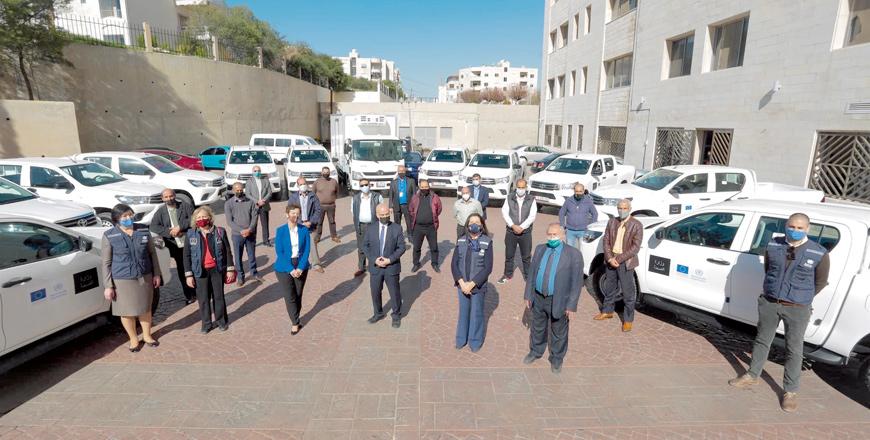You are here
EU supports WHO to develop Jordan’s primary health care services under COVID-19
By JT - Nov 02,2020 - Last updated at Nov 02,2020
AMMAN — Under the “Jordan Health Programme for Syrian Refugees and Vulnerable Jordanians”, the European Union (EU) has committed €43 million to support the World Health Organisation (WHO)’s efforts to strengthen Jordan’s primary healthcare services.
The funds will allow the WHO to support the government’s response to the COVID-19 pandemic and improve primary health care, while expanding access to services to vulnerable Jordanians and Syrian refugees, according to an EU statement.
This three-year long programme funded by the EU, through its Regional Trust Fund in response to the Syrian crisis, “Madad”, includes, among other actions, support to the immediate needs of the Ministry of Health in response to COVID-19, as identified in the National Preparedness and Response Plan to COVID-19.
This support includes two main components:
— Improving primary health care, vaccine-preventable disease immunisation and surveillance, and COVID-19 preparedness and response. As part of this, more than 230,000 doses of influenza vaccines, worth around €1.2 million, will be distributed by the Ministry of Health in a timely manner, to help reduce the burden on Jordan’s health system.
— Improving the public health system and providing sustainable health financing to strengthen government capacity therein, as well as supporting the effort to review the health approaches within the Ministry of Health, in particular to develop a costed and long-term strategy that “aims to leave no one behind”.
EU Ambassador to Jordan Maria Hadjitheodosiou commended the programme for its timely support to Jordan’s health sector in its effort to fight COVID-19.
“The EU is aware of the enormous pressure of COVID-19 on the health sector in Jordan. As part of our ‘Team Europe’ response we will continue to sustain the provision of health services to vulnerable Jordanians and Syrian refugees,” Hadjitheodosiou said in the statement.
“Protecting health by ensuring essential health services and supporting health systems is a critical component of UN Framework for the immediate socio-economic response to COVID-19,” stated Maria Cristina Profili - WHO Representative to Jordan in the statement.
The Health Programme provides routine vaccines, cold chain equipment, cars for the Ministry of Health’s vaccination teams to reach population in remote areas, laboratory equipment and COVID-19 diagnostic kits to expand the Central Public Health Laboratory testing capability, personal protective equipment for health workers and rapid response teams conducting contact tracing, flu vaccines and COVID-19 vaccines – when available.
Effective coordination between WHO, the Ministry of Health, key health partners, and the donor community has been a key element that ensures success, as well as effective preparedness and response to the COVID-19 pandemic and successful support to critical Primary Health Care activities, read the statement.
Since its establishment in December 2014, a significant share of the EU’s non-humanitarian aid for Syria’s neighboring countries is being provided through the EU Regional Trust Fund in Response to the Syrian Crisis, according to the statement
The Trust Fund brings a more coherent and integrated EU aid response to the crisis and primarily addresses economic, educational, protection, social, and health needs of refugees from Syria in neighbouring countries such as Jordan, Lebanon, Turkey and Iraq, and supports overstretched local communities and their administrations, the statement said.
Related Articles
AMMAN — To support the Ministry of Health’s transportation and delivery of routine and COVID-19 vaccines through mobile immunisation centres
AMMAN — The European Union has committed 43 million euros, through the EU Regional Trust Fund in Response to the Syrian Crisis (MADAD), to s
AMMAN — Through funding from the EU Regional Trust Fund in Response to the Syrian crisis (Madad Fund), the World Health Organisation (WHO) a

















